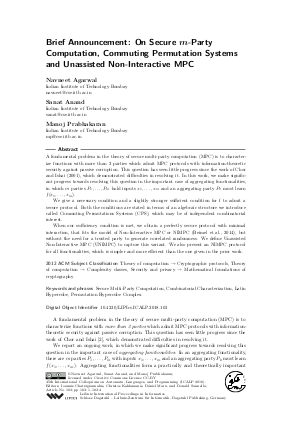Brief Announcement: On Secure m-Party Computation, Commuting Permutation Systems and Unassisted Non-Interactive MPC
Authors Navneet Agarwal, Sanat Anand, Manoj Prabhakaran
-
Part of:
Volume:
45th International Colloquium on Automata, Languages, and Programming (ICALP 2018)
Part of: Series: Leibniz International Proceedings in Informatics (LIPIcs)
Part of: Conference: International Colloquium on Automata, Languages, and Programming (ICALP) - License:
 Creative Commons Attribution 3.0 Unported license
Creative Commons Attribution 3.0 Unported license
- Publication Date: 2018-07-04
File

PDF
LIPIcs.ICALP.2018.103.pdf
- Filesize: 301 kB
- 4 pages
Document Identifiers
Subject Classification
ACM Subject Classification
- Theory of computation → Cryptographic protocols
- Theory of computation → Complexity classes
- Security and privacy → Mathematical foundations of cryptography
Keywords
- Secure Multi-Party Computation
- Combinatorial Characterization
- Latin Hypercube
- Permutation Hypercube Complex
Metrics
- Access Statistics
-
Total Accesses (updated on a weekly basis)
0PDF Downloads0Metadata Views
Abstract
A fundamental problem in the theory of secure multi-party computation (MPC) is to characterize functions with more than 2 parties which admit MPC protocols with information-theoretic security against passive corruption. This question has seen little progress since the work of Chor and Ishai (2001), which demonstrated difficulties in resolving it. In this work, we make significant progress towards resolving this question in the important case of aggregating functionalities, in which m parties P1,...,Pm hold inputs x1,...,xm and an aggregating party P0 must learn f(x1,...,xm). We give a necessary condition and a slightly stronger sufficient condition for f to admit a secure protocol. Both the conditions are stated in terms of an algebraic structure we introduce called Commuting Permutations Systems (CPS), which may be of independent combinatorial interest. When our sufficiency condition is met, we obtain a perfectly secure protocol with minimal interaction, that fits the model of Non-Interactive MPC or NIMPC (Beimel et al., 2014), but without the need for a trusted party to generate correlated randomness. We define Unassisted Non-Interactive MPC (UNIMPC) to capture this variant. We also present an NIMPC protocol for all functionalities, which is simpler and more efficient than the one given in the prior work.
Cite As Get BibTex
Navneet Agarwal, Sanat Anand, and Manoj Prabhakaran. Brief Announcement: On Secure m-Party Computation, Commuting Permutation Systems and Unassisted Non-Interactive MPC. In 45th International Colloquium on Automata, Languages, and Programming (ICALP 2018). Leibniz International Proceedings in Informatics (LIPIcs), Volume 107, pp. 103:1-103:4, Schloss Dagstuhl – Leibniz-Zentrum für Informatik (2018)
https://doi.org/10.4230/LIPIcs.ICALP.2018.103
BibTex
@InProceedings{agarwal_et_al:LIPIcs.ICALP.2018.103,
author = {Agarwal, Navneet and Anand, Sanat and Prabhakaran, Manoj},
title = {{Brief Announcement: On Secure m-Party Computation, Commuting Permutation Systems and Unassisted Non-Interactive MPC}},
booktitle = {45th International Colloquium on Automata, Languages, and Programming (ICALP 2018)},
pages = {103:1--103:4},
series = {Leibniz International Proceedings in Informatics (LIPIcs)},
ISBN = {978-3-95977-076-7},
ISSN = {1868-8969},
year = {2018},
volume = {107},
editor = {Chatzigiannakis, Ioannis and Kaklamanis, Christos and Marx, D\'{a}niel and Sannella, Donald},
publisher = {Schloss Dagstuhl -- Leibniz-Zentrum f{\"u}r Informatik},
address = {Dagstuhl, Germany},
URL = {https://drops.dagstuhl.de/entities/document/10.4230/LIPIcs.ICALP.2018.103},
URN = {urn:nbn:de:0030-drops-91079},
doi = {10.4230/LIPIcs.ICALP.2018.103},
annote = {Keywords: Secure Multi-Party Computation, Combinatorial Characterization, Latin Hypercube, Permutation Hypercube Complex}
}
Author Details
References
- Amos Beimel, Ariel Gabizon, Yuval Ishai, Eyal Kushilevitz, Sigurd Meldgaard, and Anat Paskin-Cherniavsky. Non-interactive secure multiparty computation. In Juan A. Garay and Rosario Gennaro, editors, Advances in Cryptology - CRYPTO 2014 - 34th Annual Cryptology Conference, Santa Barbara, CA, USA, August 17-21, 2014, Proceedings, Part II, volume 8617 of Lecture Notes in Computer Science, pages 387-404. Springer, 2014. URL: http://dx.doi.org/10.1007/978-3-662-44381-1_22.
-
Benny Chor and Yuval Ishai. On privacy and partition arguments. Information and Computation, 167(1):2-9, 2001.

- Deepesh Data, Manoj Prabhakaran, and Vinod Prabhakaran. On the communication complexity of secure computation. CoRR Report 1311.7584 available from http://arxiv.org, 2013.
- Uriel Feige, Joe Kilian, and Moni Naor. A minimal model for secure computation (extended abstract). In STOC, pages 554-563. ACM, 1994. URL: http://dx.doi.org/10.1145/195058.195408.
-
Yuval Ishai and Eyal Kushilevitz. Randomizing polynomials: A new representation with applications to round-efficient secure computation. In FOCS, pages 294-304, 2000.

-
Satoshi Obana and Maki Yoshida. An efficient construction of non-interactive secure multiparty computation. In Cryptology and Network Security - 15th International Conference, CANS 2016, Milan, Italy, November 14-16, 2016, Proceedings, pages 604-614, 2016.

-
Manoj Prabhakaran and Vinod Prabhakaran. On secure multiparty sampling for more than two parties. In Proceedings of the 2012 IEEE International Information Theory Workshop (ITW 2012), 2012.

- Manoj Prabhakaran and Mike Rosulek. Cryptographic complexity of multi-party computation problems: Classifications and separations. In David Wagner, editor, Advances in Cryptology - CRYPTO 2008, 28th Annual International Cryptology Conference, Santa Barbara, CA, USA, August 17-21, 2008. Proceedings, volume 5157 of Lecture Notes in Computer Science, pages 262-279. Springer, 2008. URL: http://dx.doi.org/10.1007/978-3-540-85174-5_15.
-
Sundara Rajan S, S. Rajakrishnan, A. Thangaraj, and V. Prabhakaran. Lower bounds and optimal protocols for three-party secure computation. In 2016 IEEE International Symposium on Information Theory (ISIT), pages 1361-1365, July 2016.

